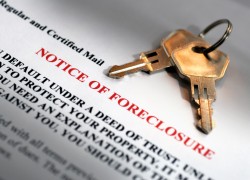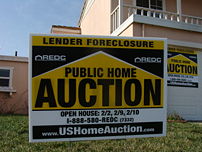
 If you are behind in your mortgage payments, it is likely you have received a Notice of Default (NOD) also known as a Foreclosure notice from your lender. A Notice of Default (NOD) is a public notice to you, as well as the world, that you have defaulted on your mortgage and the lender intends to take foreclosure action if you do not pay by the regulated redemption period. What should you do if you receive a NOD?
If you are behind in your mortgage payments, it is likely you have received a Notice of Default (NOD) also known as a Foreclosure notice from your lender. A Notice of Default (NOD) is a public notice to you, as well as the world, that you have defaulted on your mortgage and the lender intends to take foreclosure action if you do not pay by the regulated redemption period. What should you do if you receive a NOD?
Immediately Contact the Lender
You must NOT ignore the NOD, other foreclosure proceedings, or your lender. Call them at once and tell them about your situation. Most lenders are willing to work with their borrowers on keeping their loan in good standing and helping through financial difficulty to ultimately avoid foreclosure. The problem arises when borrowers have financial difficulty and simply stop paying on their mortgage without any explanation to the lender.
Discuss the Mortgage Payment Options
When you contact your mortgage lender, discuss with them your financial situation and what you can do to keep your loan current. If you have a significant change in your income, or your mortgage payment was increased considerably, you may be eligible for a loan modification based on your current income.
A loan modification changes the terms of the loan, such as the interest rate or lifespan of the loan, to create a lower monthly payment. While this means less income for the lender, if you are unable to meet your current mortgage obligation, yet still have a regular income, it is a better alternative than foreclosure. You will have to provide financial information and a hardship letter to your lender. If you are not comfortable with mortgage terms and issues, hire a professional service to negotiate on your behalf.
In addition, you may discuss payment forbearance or forgiveness of past-due debt. In many cases, lenders are willing to forbear loan payments up to three to six months to help a borrower get back on his feet financially. In cases of extreme financial difficulty, some lenders may even forgive payments and fees in arrears and allow the borrower to start fresh if they promise to keep current.
Consider a Short Sale Before a Foreclosure
There is almost no reason to walk away from a home and allow a lender to foreclose. If, ultimately, you cannot afford the mortgage, you can sell the home and pay the lender what is owed on the mortgage. However, this may be more difficult if you owe more than what your home is worth on the market. Many homeowners in mortgage trouble are finding this to be the case with falling real estate market values.
However, a lender can be persuaded to accept a “short sale†on a home. In this situation, they agree to let you sell the home for the lower market value, pay them the full proceeds from the sale, and then write off the outstanding balance. Why do lenders agree to a short sale? Ultimately, it is cheaper than proceeding through a full foreclosure process, which involves attorney’s fees, holding losses, and an inevitable short sale from the lender’s end as well.
A NOD is not the end of the road for a homeowner. It is just the first legal process in foreclosure. Remember that you have the right to discuss and re-negotiate your mortgage. Although you may lose your home, there are options to sell so that the lender does not foreclose and you prevent further credit issues.

![Reblog this post [with Zemanta]](http://img.zemanta.com/reblog_e.png?x-id=15d77b79-37c1-41e8-9a46-e69563c1a2f7)
